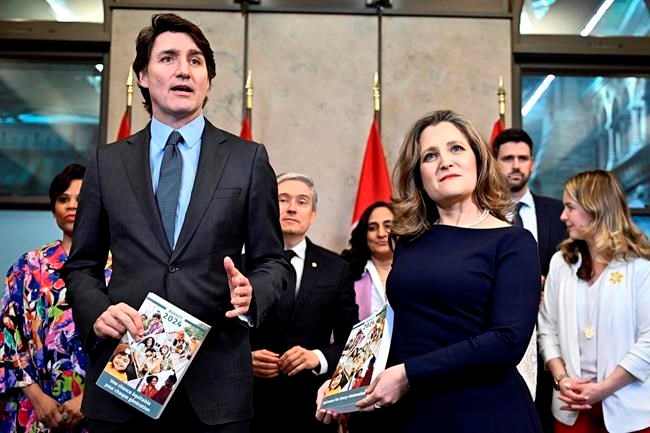OTTAWA — The 2024 federal budget will provide "generational fairness" to younger Canadians by raising taxes on those who have already capitalized on Canada's economic strengths, Finance Minister Chrystia Freeland said Tuesday as she tabled the document in the House of Commons.
The budget comes as the Liberals have watched their once-healthy voting base among young people evaporate in favour of the Conservatives, largely as younger Canadians feel like the economic deck is stacked against them.
Freeland denied Tuesday that her latest budget is mainly a political exercise — but nonetheless acknowledged that for anyone under 40 in Canada, it's "just harder to establish yourself" than it was for the generations that came before.
A middle-class income and a good job is no longer enough to feel economically secure, she said.
"It really isn't fair what they are struggling with right now," Freeland told a news conference earlier in the day prior to her budget speech in the House.
Freeland said the 2024 budget is designed to fix that problem, to "unlock the door to the middle class" for more Canadians. The budget document itself uses the word fairness 50 separate times.
There is $8.5 billion in new spending over the next five years to build millions of new homes and nearly $2.6 billion to enhance student aid and grant programs and open up new job opportunities.
"We are acting today to ensure fairness for every generation," Freeland said.
Overall, the budget's projected spending will rise to $535 billion in 2024-25, compared with $497.5 billion in 2023-24. The deficit is projected at $39.8 billion, compared with $40 billion last year.
There is $11.5 billion in new spending this year and $53 billion over the next five years.
Freeland said she is maintaining the fiscal anchors she set for the government, keeping the deficit below $40 billion and to less than one per cent of GDP starting in 2026-27.
Ottawa is paying for some of that with better-than-expected economic growth, but also with targeted changes to the capital gains tax that are expected to raise more than $19 billion over the next five years.
Currently Canadians only pay taxes on 50 per cent of the money they make from capital gains, which refers mainly to profits made from selling an asset like a stock.
Freeland is adjusting that to 66 per cent for all capital gains made by corporations and trusts, and for those that exceed $250,000 for individuals.
She said the change should affect 0.13 per cent of Canadians who have an average annual income of $1.4 million. She said she knows the tax increase will generate blowback.
"But before they complain too bitterly, I would like Canada's one per cent — Canada's 0.1 per cent — to consider this: what kind of Canada do you want to live in," she asked in her speech.
The budget includes money for new national dental care and pharmacare programs, and also includes previously announced spending for a new national school lunch program.
"Do you want to live in a country where you can tell the size of someone’s paycheque by their smile?" Freeland asked.
"Do you want to live in a country where kids go to school hungry? Do you want to live in a country where a teenage girl gets pregnant because she doesn’t have the money to buy birth control?"
James Orlando, director of economics at TD, said while it's true the budget keeps the government within its fiscal anchors on paper, the new tax hike is not helpful for productivity and said the new spending is "greater than we ever thought."
The budget, he said, is more about thinking ahead to the economy the government believes Canadians want in the future.
"This isn't spending just to boost the economy today, but rather improve the trajectory of the Canadian economy going forward," he said.
"They would say that they're focused on the long-term benefit of their spending right now, not just necessarily having an immediate impact on the Canadian economy."
NDP Leader Jagmeet Singh, who has a supply-and-confidence deal with the Liberals to support them on key votes like the budget, nevertheless would not immediately promise to back the government's latest spending plan.
The budget embraces multiple NDP ideas, including a protection fund for renters and pharmacare, but fails to go after "corporate greed," Singh said.
Conservative Leader Pierre Poilievre was less equivocal.
"Conservatives will vote against this wasteful, inflationary budget that is like a pyromaniac spraying gas on the inflationary fire that he lit," Poilievre said in the House.
"It is getting too hot and too expensive for Canadians, and that's why we need a carbon tax election to replace him with a common-sense Conservative government."
This report by The Canadian Press was first published April 16, 2024.
Mia Rabson, The Canadian Press




